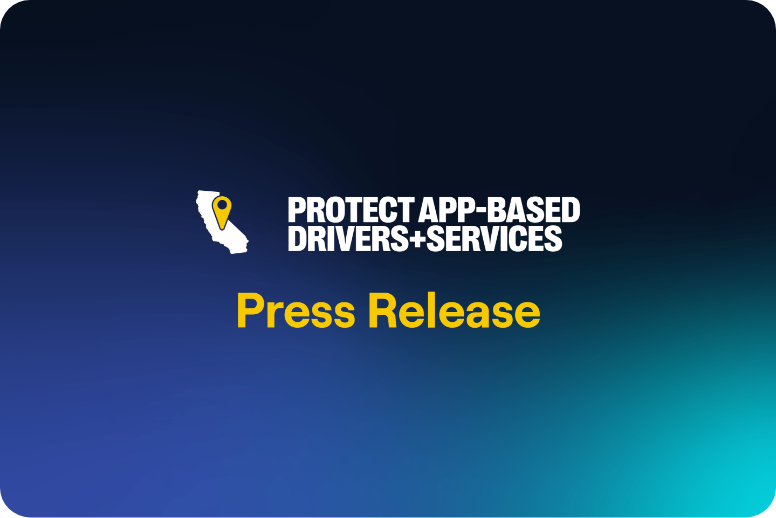By Carolyn Said – Staff Writer, San Francisco Chronicle
Get ready for a blizzard of advertising about “protecting freedom” by Uber, Lyft, DoorDash and other on-demand services.
A $110 million campaign on Thursday said it has gathered more than 1 million signatures in seven weeks for a ballot measure to exempt on-demand drivers and couriers from AB5, California’s new gig-work law. The “Protect App-based Drivers & Services” measure would keep drivers and couriers for app-based companies as independent contractors, while giving them some earnings guarantees and benefits.
The new law makes it harder for companies to claim that workers are independent contractors, rather than employees. Many on-demand companies say that their business models and drivers themselves rely on the flexibility of gig work. Making drivers into employees could add up to 30% to labor costs, something the money-losing companies can ill afford.
County clerks now must certify that the signatures are valid, a process that can take some weeks, but the campaign has a comfortable margin of error to hit the 623,212 signatures required to qualify for the November ballot. The campaign paid signature gatherers $4 for each John Hancock they landed. While high, it was shy of the $5 paid by Native American tribes for a sports gambling measure.
Next, the campaign will blanket the state with ads to get its message to voters.
“You’re going to see everything; it’s a big state and a big campaign,” said Stacey Wells, a campaign spokeswoman.
Uber, Lyft and DoorDash have each put up $30 million for the campaign; Postmates and Instacart each put up $10 million.
With organized labor prepared to pay a lot to counteract the measure, it could wind up as one of California’s most expensive ballot measures, rivaling the $154.6 million spent on referendums against gaming compacts on the 2008 ballot, or the $150.8 million spent on 2006’s Prop 87, which sought to tax oil production to fund alternative energy, according to Ballotpedia.
“We’re going to mount as significant an effort as possible, resources-wise,” said Steve Smith, a spokesman for the California Labor Federation, predicting that labor will put up tens of millions of dollars. “We may not be able to match them dollar for dollar, but we will have a very robust campaign.” Unions have formed a committee, the coalition to Protect Drivers and Riders, to run their campaign against the Uber-Lyft-DoorDash measure.
Unions have something even more valuable than money in an election: 2.5 million members in California.
“One thing we do better than any organization anywhere is have face-to-face conversations on a massive scale,” Smith said. “In any effort like this, that’s particularly important.”
Of course, on the other side, the app-based drivers measure has millions of Californians who rely on Uber and Lyft to get around and on DoorDash, Postmates and Instacart to deliver food, as well as hundreds of thousands of drivers.
Kenn Zendels of Windsor worked as a paid signature gatherer for the app-based drivers measure, as well as several other initiatives, setting up an ironing board at locations such as outside grocery stores to make it easy for people to sign. He also works as an Uber/Lyft driver, something he was sure to point out to prospective signers.
Zendels said a lot of people he approached were not fans of AB5.
Lots of other prominent measures, such as a property tax split roll — not to mention a presidential election — will vie for voters’ attention in November as well.
“It will be a busy ballot but Californians are savvy and they’re used to it,” Wells said. “This one has been out early and strong so I think we will rise above the clamor pretty easily.”
In other AB5 news, bill author Assemblywoman Lorena Gonzalez, D-San Diego, introduced language Thursday as part of AB1850, a bill to make adjustments to AB5, that would lift a 35-submissions-a-year cap for freelance writers and photographers, who had sued over AB5. Gonzalez tweeted earlier this month that she planned to make those changes.
The new language also clarifies that contractors cannot replace employees and that contracts with freelancers should specify payment, pay timetable and intellectual property rights. Freelance journalists must work through a sole proprietorship or other business and have a workplace other than the client’s office.
Language addressing the concerns of musicians is expected next month.
AB5 has stirred controversy among legions of freelancers, performing-arts companies, truck drivers, musicians and others who say it destroys their ability to make a living. Various legal challenges are wending their way through the courts. Republican lawmakers have introduced numerous measures to change it and exempt various groups but they are unlikely to gain traction with Democrats holding super-majorities in both the Senate and Assembly.
AB1928, a measured introduced by Assemblyman Kevin Kiley, R-Sacramento, that would repeal AB5, failed to win enough votes to be heard on the Assembly floor on Thursday.
“We are formulating next steps, but (Kiley) will keep fighting to get something done sooner rather than later,” said Joshua Hoover, a spokesman for Kiley, in an email.
The Latest News

Press Releases
California Supreme Court Unanimously Upholds Prop 22 in Historic Ruling
Date: July 25, 2024 Contact: Molly Weedn, (415) 209-4217 [email protected] California Supreme Court Unanimously Upholds [...] Read more
Press Releases
PADS Responds to Conclusion of Oral Arguments on Prop 22
Date: May 21, 2024 Contact: Molly Weedn, (415) 209-4217 [email protected] The Coalition to Protect App [...] Read more